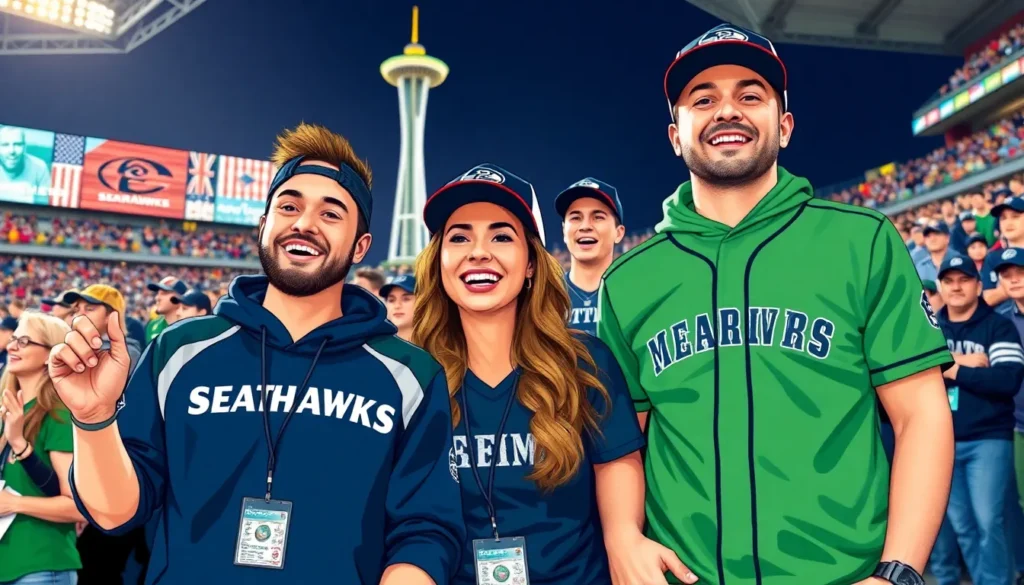In a world where sports reign supreme, sports events companies are the unsung heroes behind the scenes. They’re the masterminds orchestrating everything from adrenaline-pumping marathons to nail-biting championship games. Without them, we’d be left with nothing but a bunch of athletes awkwardly standing around, wondering what to do next.
Sports Events Companies
Sports events companies play a pivotal role in organizing and managing various competitions. These companies are responsible for logistical planning, marketing, sponsorship acquisition, and overall event execution. They ensure athletes compete in well-orchestrated environments, providing the necessary support for both participants and spectators.
Event management encompasses a wide range of tasks. Companies design the layout of venues, handle ticketing processes, and coordinate transportation and accommodations for teams. They also manage onsite staff, including volunteers, security personnel, and medical teams, ensuring safety and efficiency.
Sponsorship is crucial for funding events effectively. Companies negotiate deals with brands to secure financial support, enhancing the overall experience for participants and fans. This collaboration often leads to increased visibility for sponsors, as sports events attract large crowds and extensive media coverage.
Technology plays an integral role in modern sports events. Companies utilize digital platforms for ticket sales, real-time updates, and fan engagement. Social media interaction fosters a connected community around events, promoting greater attendance and participation.
Several notable sports events companies are recognized for their impact on the industry. Companies like IMG, Octagon, and Informa Markets have established themselves as leaders in managing high-profile events. Their expertise drives innovation and excellence across various sports and geographic locations.
Overall, sports events companies contribute significantly to the success of sporting events. Their ability to coordinate complex elements ensures memorable experiences for athletes and fans alike. As the sports landscape evolves, these companies will continue to adapt, bringing new ideas and strategies to future events.
Types of Sports Events Companies

Sports events companies come in various forms, each specializing in a unique aspect of event management. These companies play essential roles in different capacities within the sports industry.
Event Management Firms
Event management firms focus on the overall planning and execution of sporting events. They coordinate logistics such as venue selection, scheduling, and staffing. These companies typically manage ticketing processes, ensuring seamless experiences for attendees. They oversee event setup and takedown, handling everything from staging to sound equipment. Experienced event managers often create detailed timelines that guide the event operation. Notably, such firms ensure compliance with safety regulations, which protects participants and spectators.
Marketing and Sponsorship Agencies
Marketing and sponsorship agencies concentrate on promoting events and securing funding. They develop strategic marketing plans that enhance visibility and audience engagement. These agencies identify potential sponsors, crafting tailored proposals that outline mutual benefits. This approach draws in significant financial support, vital for successful event execution. Effective marketing agencies utilize digital platforms to connect with audiences, boost ticket sales, and enhance brand presence. They also analyze event performance metrics, helping clients improve future events.
Key Players in the Industry
Sports events companies play a critical role in shaping the landscape of sporting events. They help organize everything from local tournaments to international championships.
Leading Sports Events Companies
IMG, Octagon, and Informa Markets stand out as leaders in the sports events industry. IMG excels in managing high-profile sporting events and leverages extensive networks for marketing and sponsorship. Octagon focuses on innovative fan engagement strategies, enhancing the overall experience for attendees and athletes. Informa Markets specializes in connecting stakeholders through well-organized global sports events, creating opportunities for growth and collaboration.
Emerging Companies to Watch
Several emerging companies are making waves in the sports events sector. Venuetize offers technology solutions that streamline ticketing and enhance fan experiences via mobile platforms. Eventbrite stands out for simplifying event organization, offering user-friendly tools that facilitate marketing and attendance tracking. A new player, PlayCreate, focuses on grassroots events, emphasizing community engagement and promoting local talent development. These companies highlight the industry’s shift towards technology integration and fan-centric approaches.
Services Offered by Sports Events Companies
Sports events companies provide essential services that enhance the overall experience of sporting events. Their expertise spans various areas, ensuring successful execution and memorable experiences for athletes and fans.
Event Planning and Coordination
Event planning and coordination remain fundamental to the services offered. Professionals assess venue options, manage schedules, and oversee compliance with safety regulations. They handle logistics like ticketing processes, ensuring smooth entry for attendees. Onsite staff receive training to maintain safety and efficiency throughout the event. With a focus on detail, event management firms create an environment where athletes can perform at their best. Coordination helps in balancing various elements, including transportation for teams, securing permits, and addressing potential challenges that might arise.
Promotion and Marketing Strategies
Promotion and marketing strategies are crucial for maximizing attendance and revenue. Companies develop targeted marketing plans that engage potential attendees and sponsors. They utilize digital platforms for ticket sales and fan engagement, reaching wider audiences efficiently. Social media channels serve as vital tools for broadcasting event highlights and athlete stories. Tailored proposals attract sponsors, aligning their brands with the event’s vision and demographics. Successful marketing campaigns elevate the event’s profile and enhance the experience for both participants and spectators.
Challenges Faced by Sports Events Companies
Sports events companies encounter numerous challenges that impact their operations and success. Financial constraints create significant hurdles. Many companies depend on sponsorships for funding, which can fluctuate based on market dynamics and investor interest. Companies often find it difficult to secure reliable sponsors, especially during economic downturns.
Logistical complexities also present major challenges. Companies manage multiple vendors and suppliers, coordinating schedules, transportation, and onsite staff. Miscommunication or delays can lead to operational disruptions, affecting the overall experience for athletes and fans.
Technological integration poses another challenge. Companies must stay updated with the latest advancements in ticketing and fan engagement. Inadequate technological adoption can hinder their ability to provide a seamless experience for attendees and limit their competitive edge.
Event safety and compliance are critical factors as well. Companies navigate regulations and standards, especially in large-scale events where safety risks can escalate. Non-compliance can not only lead to penalties but also jeopardize participant safety, creating liabilities.
Market competition intensifies the pressure faced by sports events companies. Emerging firms leverage innovative approaches to attract sponsors and audiences, making it essential for established companies to adapt continually. Additionally, the evolving preferences of fans demand constant innovation in marketing strategies and engagement.
Weather conditions also impact outdoor events significantly, often resulting in cancellations or postponements. Companies must develop contingency plans to manage weather-related challenges effectively. Each of these challenges necessitates strategic planning and agile responses to ensure the successful execution of sporting events.
Conclusion
Sports events companies are indispensable in shaping the sporting landscape. Their expertise in logistics marketing and sponsorship acquisition creates environments where athletes can thrive and fans can engage. As they navigate challenges like financial constraints and technological advancements they continue to innovate and adapt.
The impact of these companies extends beyond mere event execution. They foster community engagement and enhance the overall experience for participants and spectators alike. With the rise of emerging firms focusing on technology integration the future of sports events looks promising. These companies will remain at the forefront of transforming how sports are experienced ensuring that every event is memorable and well-coordinated.



